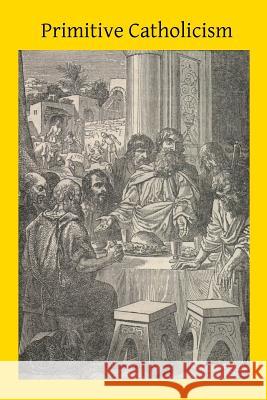Primitive Catholicism » książka
Primitive Catholicism
ISBN-13: 9781496186225 / Angielski / Miękka / 2014 / 452 str.
The prophesy of Abbess Maria Steiner says: "I see the Lord as he will be scourging the world and chastising it in a fearful manner so that few man and women will remain. The monks will have to leave their monasteries and the nuns will be driven out of their convents, especially in Italy... The Holy Church will be persecuted... Unless people obtain pardon through their prayers, the time will come when they will see the sword and death, and Rome will be without a shepherd. But the Lord showed me how beautiful the world will be after this awful punishment (chastisement). The people will be like the Christians of the primitive Church. The Council meets again after the victory. But this time men will be obliged to obey." The author writes: The subject I am proposing to treat, and which, if God permit, I intend at some future day to pursue down to the epoch of St. Augustine:: md St. Leo, is the history of the formation of Catholicism, that is to say, of the Church in so far as it is a visible, universal society, built upon the fra, mework of a rule of faith and a hierarchy. In the present volume on "Primitive Catholicism," I study the origins of this formation, taking the time of St. Cyprian as the term of these origins. It might indeed be contended that their real term was reached more than half a century before his time, but his writings and the discussions in which he took a leading part, show so clearly that the doctrines and institutions of Catholicism were then generally accepted, and, on the other hand, the historical continuity that had governed the development of these doctrines and institutions up to his day, makes itself so sensibly felt in these same writings, that they complete for us in an admirable manner the knowledge we are able to acquire of the two hundred years of previous Christianity. We must confess, however, that it is not without some timidity we approach the study of these two centuries of primitive history, seeing that the documentary evidence, abundant as it is, gives us but a faint idea of the early Christian life, so varied, so complex, so deep How much light we should be deprived of, had not the Epistles of St. Ignatius and the Apologies of St. Justin been preserved On the other hand, how much more light we should have, were the" De Ecclesia" of Melito and the "Memorabilia" of Hegesippus still extant The discovery of the "Didache" has been a genuine revelation and has obliged scholars to correct many an inference. So too has the discovery of the Odes of Solomon. The preservation of the texts, as well as their loss, is something accidental. For this reason history, when dealing with centuries concerning which we have few and scanty documents, is a science of only approximate correctness, always susceptible of revision, except as regards certain manifest facts, and some general features inferred from several series of concordant observations. Such is the condition of primitive ecclesiology. Its history is made up of a few features which, clearly marked from the beginning, acquire with each successive generation a more vigorous and expressive prominence.
Zawartość książki może nie spełniać oczekiwań – reklamacje nie obejmują treści, która mogła nie być redakcyjnie ani merytorycznie opracowana.











